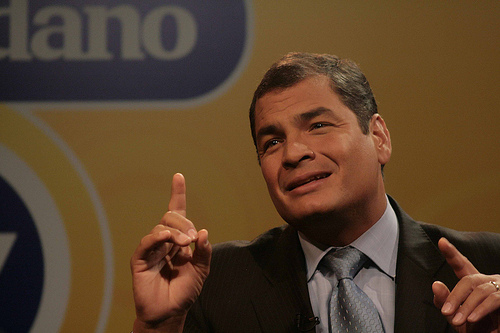It's nothing new that in Ecuador Twitter and other social networks have been the main mediums of criticism and support for President Rafael Correa. Now, a campaign dubbed #undedoparacorrea (a finger for Correa) has appeared on Twitter and other social networks. On the campaign's webpage, people are shown in photographs with their middle fingers raised in protest against the idea that you could be arrested for something as silly as raising your finger [es]”.
UN DEDO PARA CORREA ES PROTESTA, NO PROPUESTA: Sería absurdo que hacer dedo fuera una propuesta. Una protesta tampoco tiene por qué ser profunda, ideal, dogmática, masiva, intelectual, ideológica, etc. Puede ser tan simple como mostrar el dedo como elemental señal de inconformidad. Teniendo en cuenta además la coyuntura actual (un presidente que usa recursos públicos para perseguir e injuriar) es una protesta válida. Ni más ni menos. Simplemente válida.
A FINGER FOR CORREA IS A PROTEST, NOT A PROPOSAL: It would be absurd to think that giving someone the finger would be a proposition. Nor does a protest need to be profound, ideal, dogmatic, massive, intellectual, ideological, etc. It can be as simple as raising a finger as an elemental sign of nonconformity. Moreover, taking into account the current situation (a president who uses public resources to pursue or insult) is a valid protest. Nothing more, nothing less. Simply valid.

President of Ecuador Rafael Correa, from Flickr user Presidency of the Republic of Ecuador (CC BY-NC-SA 2.0)
The story of the finger and its campaign starts with the detention of Irma Parra on April 13; she was driving past the presidential delegation in her car when she raised the index finger of her left hand and made “NO” signs referring to a constitutional referendum. The government says that Irma Parra not only manifested her opposition to the government, but that she also raised her middle finger and made an obscene gesture to the Head of State. The polarised Ecuadorian media gave only superficial coverage of the woman's arrest saying she supported a “No” in the referendum and repeating the accusations of aggression against the President.
The woman was detained and accused of misdemeanours against the administration, under the Rebellion and Attempts against Public Servants Act (Art. 230, Penal Code).
Accusations like these, the number of people arrested during Correa's national tours, freedom of speech and public order, and other topics have been brought up in the campaign on social networks.
Henry Raad [es] wrote sarcastically in his blog on the “finger”:
Parecería ser un miembro inofensivo e insignificante del cuerpo humano, casi un simple apéndice al final de cada mano. No le hemos dado su debida importancia y tan es así, que la flamante Constitución de Montecristi no le dedica un párrafo siquiera. Creo que es un error ya que ha cobrado trascendencia en el léxico penal ecuatoriano y ya amerita legislar debidamente.
María Rosa Pólit A. explains the campaign in an opinion piece [es] in El Teléfrago:
surgió de manera espontánea una acción de protesta ciudadana que se promueve en la red social Twitter, la cual desafía abierta y categóricamente la criminalización de una conducta que no representa peligro para los ciudadanos
Columnist Carlos Andres Vera in his blog Polificcion [es] (Polifiction), adds this to the criticism:
Como señalaba Belén Proaño en twiter, es curioso que el Gobierno se dirija siempre “a sus mandantes”. Notas la contradicción? Puedes ver el peligro en concebir el poder de esa manera? Simplemente no me cuadra ese discurso del “me respetan porque me respetan”. Lo rechazo, tajantemente. En ese sentido, no estamos cayendo en su juego. Si lo hiciera, demandaría que cada persona que me ha insultado, (son muchísimas) se vayan detenidas. Podría empezar con todos los insultos en mi blog, twitter y facebook. Pero simplemente los ignoro. Esa es la mejor respuesta.
Carlos Jijón (@carlosjijon) writes:
Todo el poder del Estado contra Irma Parra. SRI, el ministerio d Trabajo,los 3 canales del Estado persiguen a una mujer que levantó un dedo.
Jose Jalil Perez (@j_jalil_perez) compares this “finger” with the Book Fair controversy in Buenos Aires for the “El Gran Hermano” [es] (The Big/Great/Elder Brother) book that speaks of the scandal of million dollar contracts linked to Fabricio Correa, the elder brother of President Correa. A public servant by the name of Jose Torres came to withdraw the book from the fair and when he was confronted by journalists and attendees at the fair he also raised “the finger” [es]. Perez comments:
@janethinostroza en lo del dedazo de Irma Parra sólo lo han visto los testigos y el de Torres es invento lo que refleja la cámara
Liliana Cordova (lilaladiva) replied:
@restevesd: @mashiroberto @cruzcelta @AuzFabian #undedoparacorrea es hecho por cobardes q no pueden debatir con argumentos y recurren a eso
Roberto Wohlgemuth (@MashiRoberto) indicates:
@eduardovarcar @rafaelugon @roosjs @Polificcion a esta campaña no lo veo como aporte. Como ofensa sí.
Martín Pallares en Desde la Tranquera [es] affirms:
Indudablemente que tener un Presidente incapaz de tolerar lo que un ciudadano le diga, así sea mediante la más obscena de las señas, es indigno para una sociedad que pretenda vivir con normas democráticas.
On the proposition Alfredo Paulsen comments [es]:
Merece difusión (aportaré con mis seguidores de twitter y amigos de Facebook, aparte de los de la vida real
In the blog YucaJurídica [es] they have gone from the protest to the proposal:
En días pasados, el hashtag twitero #undedoparacorrea y la web www.undedoparacorrea.com no solo generaron adhesión o rechazo, sino el interés de algunos usuarios de esa red social para que la PROTESTA no muera solo en un “yucazo” sino que evolucione a una PROPUESTA que defienda elementales principios democráticos y de libertad de expresión, desde lo jurídico.






